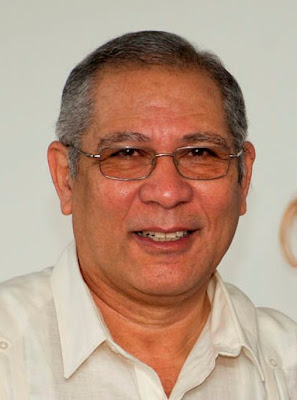WASHINGTON RECHAZA DIÁLOGO A LA ENGAÑOSA RAMA DE OLIVO QUE RAÚL CASTRO LE OFRECE AL GOBIERNO NORTEAMERICANO
Nota del Blogguista
Raúl Castro sencillamente lo que ha hecho es tirar un bluff, o farol, que ya en otras ocasiones ha lanzado Fidel Castro.
El cambio de liderazgo en las cámaras Alta ( Senado) y Baja ( Congreso), favorables al Partido Demócrata es la razón por la que con ese bluff la tiranía quiere ganar la partida sin dar nada a cambio.
*************
Washington rechaza diálogo
Una portavoz del Departamento de Estado dijo al final de la tarde de hoy que Estados Unidos mantiene firme su política exterior hacia Cuba y que, en todo caso, el diálogo sobre un cambio político en la isla tiene que darse "entre los cubanos". "El diálogo que debe darse es entre el régimen cubano y el pueblo cubano sobre el futuro democrático de la isla", dijo Janelle Hironimus, portavoz de la entidad federal. Aún así, reiteró que "como hemos dicho reiteradamente, cualquier profundización de nuestro acercamiento con Cuba depende de ese diálogo y de la voluntad del régimen cubano de tomar pasos concretos hacia una apertura política y una transición democrática" en la isla. "Nuestra política ha sido clara: es el Gobierno de Cuba el que debe realizar cambios".
Raul Castro extends olive branch to U.S.
By Anthony Boadle Sun Dec 3, 1:40 PM ET
HAVANA (Reuters) - Cuba's acting president, Raul Castro, departing from his brother's confrontational approach to their arch-enemy the United States, said this weekend he was open for talks with Washington
 The offer made on Saturday was the most direct overture to the United States by Fidel Castro's designated successor, who is running Cuba in the absence of its ailing leader.
The offer made on Saturday was the most direct overture to the United States by Fidel Castro's designated successor, who is running Cuba in the absence of its ailing leader.At a military parade where Cuba rolled out Soviet-era tanks and fighter jets, Raul Castro railed at increased hostility by the Bush administration and condemned the war in Iraq. But he added: "We take this opportunity to once again state that we are willing to resolve at the negotiating table the long-standing dispute between the United States and Cuba."
He said talks were only possible if the U.S. government respected Cuba's independence and did not interfere in its internal affairs.
It was the second time Raul Castro has offered to talk with Washington since he took over from his brother on July 31. Fidel Castro has not appeared in public since, fueling speculation he is close to death.
"Raul Castro's statement is extremely significant, because it is the most direct statement he has made to Washington since taking power," said Dan Erikson of the Inter-American Dialogue, a Washington policy group.
"It marks a significant departure from Fidel's longstanding preference for conflict and confrontation," he said.
Erikson said the Bush administration was too distracted by Iraq and too influenced by anti-Castro Cuban exiles in Florida to respond in any creative way.
"What Raul said is not new. It has long been our position. The important thing is it is now Raul who is saying it," a Cuban government official said.
THE PRACTICAL BROTHER
 Brian Latell, a former CIA analyst and author of the book "After Fidel," maintains that Raul Castro, the world's longest serving defense minister, is a pragmatic man who wants a different relationship with Washington.
Brian Latell, a former CIA analyst and author of the book "After Fidel," maintains that Raul Castro, the world's longest serving defense minister, is a pragmatic man who wants a different relationship with Washington."Raul wants to get beyond the 47 years of estrangement. He is the practical brother," Latell said.
The younger Castro is aware that control of Congress by the Democrats will mean renewed pressure to lift the U.S. trade and financial embargo and the ban on travel to Cuba, he said.
Washington broke off diplomatic relations with Havana in 1961, two years after Fidel Castro seized power in a revolution and turned Cuba into a Soviet ally.
Communication channels were restored with the opening of low-level diplomatic missions called interest sections in 1978. Immigration agreements to stop illegal crossings were signed after the 1994 rafter exodus that saw 30,000 Cubans take to the sea in flimsy craft to go to the United States.
In 2000 the U.S. Congress voted to allow food sales to Cuba and Havana has since bought $1.5 billion to feed its people.
Once considered the Kremlin's best friend in Cuba, Raul Castro was most impressed by China's economic prowess under communist rule and favored loosening state controls on private business after the collapse of the Soviet Union plunged Cuba into dire economic straits.
Frank Mora, a professor at the National War College in Washington, said Cuba would need access to U.S. markets and capital if it wanted to follow the China model.














1 Comments:
Con un nuevo lider para Cuba, vamos a ver si el gobierno americano va a cambiar de su tactica de asesinato que tiene para Castro. Los Americanos (el CIA) han intentado a matarle 638 veces sin resultado. Habia un documentario que se llama 638 Ways to kill Castro en la television britanica la semana pasada. Muy interesante. Verlo a www.638waystokillcastro.com
http://www.youtube.com/watch?v=1MunPrYJWy0
http://www.youtube.com/watch?v=nb0b9K5C9LA
http://www.youtube.com/watch?v=szIwqF9-imE
Publicar un comentario
<< Home